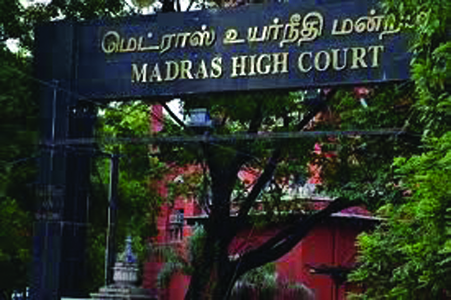CHENNAI, APRIL 10
The Madras High Court on Thursday dismissed a petition challenging the exemption of print media operations from lockdown imposed to curb the spread of COVID-19.
The order was passed by a Division Bench of Justices N Kirubakaran and R Hemalatha also makes pertinent observations on the significance of newspaper publication in a democracy, noting that that, “…. any attempt to restrict or prohibit the publication of newspapers would amount to muzzling of independence of Media.” – Madras High Court.

To drive the its significance home, the order commences with a quote by former President of the USA, Thomas Jefferson that, “Were it left to me to decide whether we should have Government without newspapers, or newspapers without Government, I should not hesitate a moment to prefer the latter.”
The Court also went on to comment, “What is expected is only the news and not the views of the publisher. News as it is has to be brought to the readers and not the views of the publishers or his ideology. Though they are entitled to put forth their ideology, people want only the news as it stands. Mixing of views and ideology should be avoided. However, it is a fact that some of the publishers are mixing their views along with the news.”
Having dwelled on these aspects, the Bench considered the thrust of the petitioner’s plea challenging the exemption of print media from the restrictions imposed during the COVID-19 lockdown.
The petitioner had raised apprehension that the coronavirus may spread through newspaper contact, given that the virus can survive on paper surfaces for about 4 days.
However, agreeing with submissions made on this count by Additional Advocate General Arvindh Pandian, the Court pointed out that there is little research to lend credence to the petitioner’s fears.
It was argued that viral transmission through newspapers is least probable. It was also added that the any possible spread of the virus through newspapers – and currency, for that matter – could be guarded against by simply washing one’s hands after handling the newspaper.
In this backdrop, the AAG submitted that to restrain print media would violate the fundamental rights of citizens under Article 19 (1) (a) of the Constitution.
The Court, in turn, noted that an expert cited by the petitioner had also opined that the likelihood of viral transmission through newspapers was low. The Bench observed, “When the professor of virology himself stated that transmission of virus through paper products is least probable, there cannot be any apprehension in the mind of people that the virus can spread through newspapers.
More research is needed to establish that the virus could spread easily through newspapers. When such is a position based on these preliminary researches and in the absence of sufficient data, the prayer sought for by the petitioner cannot be granted.”
Echoing the submissions of the AAG, the Court proceeded to point out, “Even otherwise there are methods by which the spread of virus could be prohibited/prevented by ironing the newspapers using the iron box before reading or washing the hands with soap after reading the newspapers.”
The Court, therefore, dismissed the plea, observing that, “Mere apprehension or least probability cannot be a ground to prohibit the publication of newspapers as it would amount to violation of the Fundamental Rights, of not only the publisher, editor but also the readers, guaranteed under Article 19(1)(a) of the Constitution of India.” Courtesy: barandbench.com












